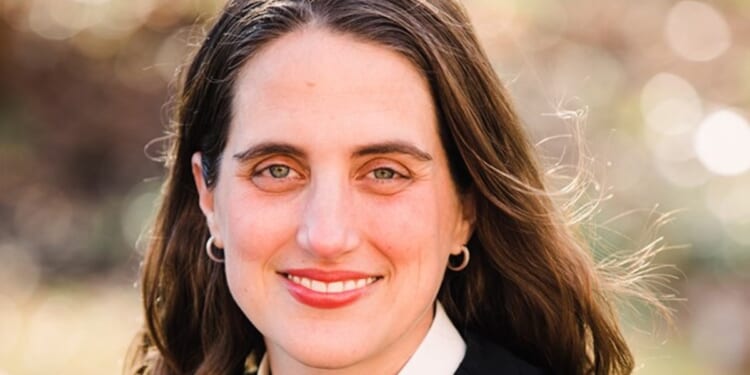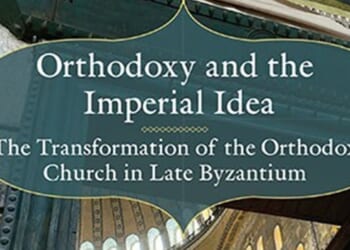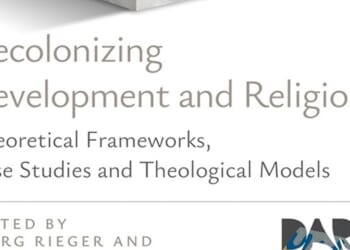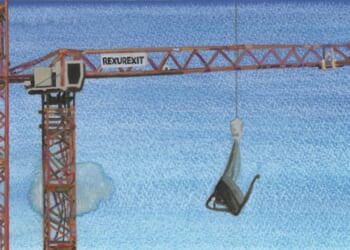YOU could say that the Revd Leyla King’s memoir has been more than 20 years in the making. At another level, it’s the work of a century: as the subtitle of Daughters of Palestine indicates — A memoir in five generations — it recounts the lives of a family over 100 years. “These are the stories of my ancestors — and they are my stories, too. They are tales handed down from one generation to the next,” she writes in a preface.
The starting gun was fired in Texas in 2002, when Ms King, in the final weeks of college, asked permission from her beloved grandmother, Bahi, to bring her cassette player and record memories of growing up in Palestine. “I always knew that I wanted to write these stories,” she says now. But the moment was never right. “I just didn’t have the time and the space and the bandwidth for that in in my life.”
Nor was the world ready to hear those stories, she says. The events that took place in her homeland on 7 October 2023 changed all that. “I found myself caught in this place of frustration and grief, and I was also, for the first time in my adult life, unemployed.”
Her British husband, the Revd Dr Benjamin King, is a professor of church history, and the couple and their three children had moved from rural Tennessee — where Ms King served as a parish priest — to Austin, Texas, so that he could take up a post at the Episcopalian Seminary of the Southwest. “I was struggling with all of this emotional upheaval, and the feeling of powerlessness in the face of my people’s decimation. And it felt like the ordained time. It felt like the woman I had become, the priest I had become, and the moment of the world around us. It was just that kairos moment . . . and, once I realised that, I wrote the book in a month.”
The memoir is recounted through the eyes of three women: Aniiseh, her great-grandmother; Bahi, her grandmother; and her own. It is not told chronologically, and the narrative takes the reader on a meandering geographical journey as branches of the family move through Palestine, Egypt, and Syria, before arriving in the US. It is a lyrical story of land lost, homes left, forced flight, and prolonged exile. Yet, as she says: “Most of those stories are really positive, and even the darker elements, I think, really resonate with hope and redemption in the end, and the power of love and faith to overcome great obstacles.”
Why did she choose this non-linear structure? “Because that’s how I heard it,” she says. “My experience of hearing those stories, and listening to them again when I was writing the book, was really like that. There was a main narrative arc that we were walking through that was historical, starting with my great-great-grandmother. But we would go down these lovely, sometimes not so lovely, side-tracks of what else was going on.”
She draws parallels with her experience in ministry. “Our stories intersect with one another and reveal new things, and, even when two stories don’t seem at all related to one another, I can see connections, the movement of God’s Spirit. That was my experience of my own story being interconnected with my grandmother’s stories, which are interconnected with all these other people’s lives and experiences.”
MS KING has travelled to the Middle East, but has never visited Palestine or Israel. She has been invited to join pilgrimages, but she is yet to take that step. “I can imagine myself going to visit the holy sites of Jesus’s life and death and resurrection, and the whole time being like, ‘Oh, but I really want to go over there, because I think that’s where my grandmother lived’; so I’ve always been a little bit hesitant.”
None the less, Palestine is her homeland. “My heart is in Palestine. [Despite] never having set foot there, I feel so connected to my ancestors, in part because of writing this book, but, in large part, just because of that connection through my mother and my grandmother. We talk about bloodlines, and it feels to me like it is in my blood in a very real, almost physical sense. I am also incredibly American; so, like so many people of mixed ethnicity, you’re sort of straddling that liminal space and have a foot in both places. But at the very core and root of who I am and where my identity lies, it is in the land of Palestine.”
She hopes that the book will be read by Western Christians, who, she says, tend to be ignorant of the history and experience of Palestinians, and particularly of Palestinian Christians. “When I present myself in churches, here in the States, I’ll be in my collar and I’ll tell someone I’m Palestinian, and people are just shocked. They have no sense that there could be a Palestinian Christian priest in the Episcopal Church: they’re flummoxed by it. It feels like a huge part of my vocation as a priest is to do this work of education through storytelling, because that’s where we get the transformation of hearts and minds.”
Does she find this hurtful? “For people that are just regular people, just trying to live their lives, I have endless amounts of grace for those folks, because we are all brought up in what is basically a Zionist soup. So I don’t fault people for their ignorance, if it is come by innocently, and if people are willing to learn.”
It is exhausting, none the less. “It feels like a very large hill to climb, but I’m climbing it. And I mean, it’s what I can offer. I can’t change the situation in Gaza right now. I can’t change the apartheid that my people are living under in Israel. I can’t do that, but I can use what power and privilege I have, and what gifts and skills I have to do this. So I’ll keep on doing it.”
After 7 October, she helped to form Palestinian Anglicans and Clergy Allies (PACA), a network of Palestinian members of the Anglican Communion and their supporters. The work is “a slog”, she says: a matter of conversation after conversation with people “who have no idea that they have been absolutely usurped by the Zionist narrative”.
THE other issue is resistance from the powerful, including some of the bishops in her own Church. Ms King is one of a small handful of Palestinian clergy in the Episcopal Church in the United States, and there are many more Palestinian lay people in the pews.
“Every House of Bishops meeting, every resolution at General Convention that has anything to do with Palestine, they will always say, ‘Well, what does the Archbishop in Jerusalem have to say?’ It is almost like [his] is the only Palestinian Christian voice that they will seek out and they will listen to. And they have no idea how deeply problematic that is, because the Archbishop in Jerusalem has to care pastorally for his people, and so he can’t say things publicly that Israel is going to absolutely clobber him for. He does not have that freedom. I find it infuriating.”
What are her views on the interventions of President Trump? She is silent for several moments. “It’s such a useless conversation to have, because, clearly, he has no idea what he’s doing. Clearly, he is wrapped up in the Zionist narrative himself, and it is deeply unfortunate that he has so much power.”
As for the possibility of peace, she says: “I always have hope, but it is a hope based on my Christian faith, a hope that comes from the unshakeable belief that God is with us, whatever happens. [But] I think it is entirely possible, and maybe even likely, that the genocide of my people in Gaza will be completed, and . . . if that should happen, I know God will be there. And if it doesn’t happen, by some miracle of God — and it will be a miracle of God — God will be there.”
She falters. “You know, it’s not just Gaza: it’s my people throughout Israel. . . I follow them on social media, and I know their stories. It is absolutely depressing. And so, I just stand on my faith, and it’s the faith of my grandmother that she passed on to me, and it’s part of that legacy.”
Alongside the pain, she lives out her what she calls “my other vocation, the other part of my priesthood”, which is her love of small churches. She is Canon for Mission in Small Congregations in the diocese of West Texas.
This is a natural follow-up to the 13-and-a-half years of parochial ministry in a small church in Chattanooga, Tennessee, and “by far the best job of my life, and probably the best job of the rest of my life”, she says. The Episcopal Church is 95 per cent made up of small churches (defined in her diocese as a church with an average Sunday attendance of 50 or fewer). Her job is to help diocesan understanding of small churches “in a way that doesn’t see them as a problem, but values them for the gifts that they bring”.
Might there be a second book in this? Maybe, she says. “But my life is super-busy right now, and writing for me is really a spiritual exercise, in the sense that it has to be inspired. So, if I try and sit down and write something, it doesn’t ever come out well. But, if I’m inspired, it is a way of prayer and connection with the divine, and with others. It has to have its kairos moment.”
Daughters of Palestine: A memoir in five generations by Leyla K. King is published by Eerdmans at £18.99 (Church Times Bookshop £17.09); 978-0-8028-8499-2.

















